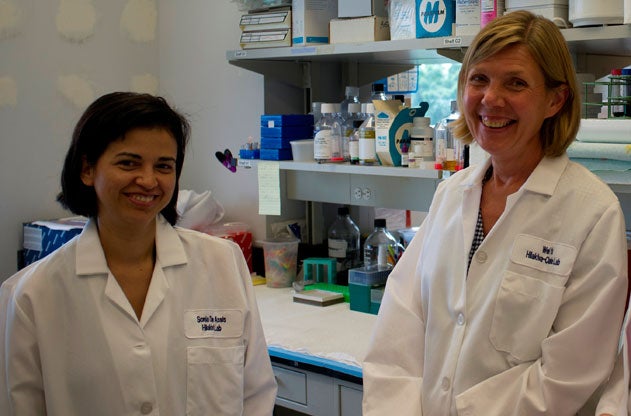Title: High-fat Diets in Pregnant Animals Influence Breast Cancer Risk in Multiple Generations
Georgetown researchers have demonstrated in animals that maternal dietary exposure during pregnancy to a high-fat diet or excess estrogen can increase breast cancer risk in multiple generations of female offspring.

Georgetown researchers have demonstrated in animals that maternal dietary exposure during pregnancy to a high-fat diet or excess estrogen can increase breast cancer risk in multiple generations of female offspring.
The study, published in Nature Communications today, shows that the risk of some “familial” breast cancers originate from biological alterations caused by maternal diet during pregnancy that not only affect the directly exposed fetus but also the fetal germ cells, transmitting the increased mammary-cancer risk to subsequent generations.
“We know that maternal diet can have long lasting effects on an offspring’s health, but this study demonstrates, for the first time, that excess estrogens and a high-fat diet can affect multiple generations of a rat’s offspring, resulting in an increase in breast cancer not only in their daughters, but granddaughters and great granddaughters,” says senior investigator Leena Hilakivi-Clarke, a professor of oncology at Georgetown Lombardi Comprehensive Cancer Center.
Hormonal Activity
The professor and her research team also found that dietary intake of excess estrogens causes epigenetic changes in the breast tissue and make it more sensitive to cancer later in life, and that these traits are inheritable.
Two-thirds of human familial breast cancers have no known genetic mutations, Hilakivi-Clarke says. The multigenerational effect of a high-fat diet and excess estrogens on breast cancer risk may explain some of those cases.
“This study could translate into important health implications,” says the study’s lead investigator, Georgetown Lombardi post-doctoral researcher Sonia de Assis,. “Fatty foods are endemic in our society, and significant levels of substances that have hormonal activity similar to estrogens, called endocrine disrupting chemicals, have been found in food and drinking water.”
Potentially Reversible
The research team, which includes investigators from institutions in Finland and the United States, tested two groups of pregnant rats and their progeny.
One group was fed a high-fat diet and the other was fed a diet with excess estrogen. Both groups were compared to control groups of rats that received diets that were neither high fat nor high estrogen.
“We found that if the mother was fed a high-fat diet before conception and throughout pregnancy, the increased breast cancer risk was transmitted to granddaughters through either male or female germ-line,” de Assis says.
In the group fed the excess estrogen diet, the researchers found 50 percent higher incidence of breast tumors in the treated rats’ daughters, granddaughters and great-granddaughters, compared to the control group. In this case, increased breast cancer risk was transmitted through females only.
The potential good news, the researchers say, is that epigenetic inheritance of breast cancer risk due to ancestral exposures might be detectable through blood testing and may be reversible.
“Our ongoing preclinical studies have found that the increase in breast cancer risk caused by in utero exposure to excess estrogens can be reversed by drugs that reverse epigenetic marks – chemical modifications that turns genes on and off – caused by the exposure,” Hilakivi-Clarke says.
Future Research
The American Cancer Society, the National Cancer Institute, the National Institute of Environmental Sciences and the National Institute of General Medical Sciences funded the research.
Co-authors include investigators from the University of Turku in Finland, Virginia Tech, the University of Texas and Johns Hopkins University medical institutions.
“This study suggests directions for future research in women,” de Assis says. “Could a woman’s susceptibility to breast cancer development be determined by what her grandmother ate when she was pregnant, or whether she was exposed to high levels of estrogen, perhaps unwittingly, through the environment?”
Grants for this study come from the American Cancer Society (116602-PF-09-018-01-CNE) and the National Institutes of Health including the National Cancer Institute (R03 CA150040, RO1 CA069065, U54 CA100970, U54CA149147, P30 CA051668 and P30 CA054174), the National Institute of Environmental Sciences (RO1 ES017594), and the National Institute of General Medical Sciences (R21 GM085665).